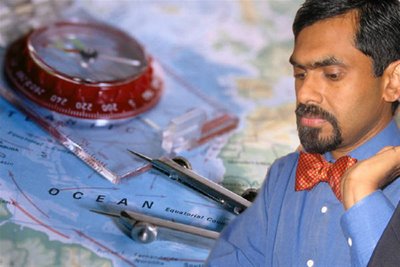
Wasn’t difficult. And I did. Many times. Get lost, that is!
Today, I was preaching at Kirkcaldy, close to Edinburgh, about 100 miles south of Aberdeen, at a friend’s church. I decided to drive myself down Sunday morning. My first long road-trip in the U.K.
Therein begins my tale of woe. Unfamiliar road-signs. Bewildering “roundabouts”—sometimes two of them back-to-back! I saw the entire city of Dundee from every possible angle and explored every available street without any clue as to what I was doing and where I was headed. Thankfully, I’d given myself enough time, anticipating this waywardness in my journey!
And I was armed with a map as well; as a matter of fact, I’d several of them, in varying amounts of detail. To top it off, I had printed off directions from Mapquest! All to no avail. I went adrift many a time, meandering from the curved and crooked path into sidetracks and goose-chases after red herrings I should have known better to steer clear of.
It’s not much use having maps and road-signs and directions, if one doesn’t know how to use them. One word comes to mind—“competence.” Competence in reading maps.
However, I’d no trouble returning, for my friend, Dave, gave me a tutorial and coached me on the intricacies of negotiating the whimsical streets of Scotland and their traps for the unwary (read “ignorant”) driver. He was a competent map-reader.
How about The Map of life?
Your word is a lamp to my feet
And a light to my path.
Psalm 119:105
And a light to my path.
Psalm 119:105
Competence in reading this Map of Scripture is incredibly critical in our journey in life. That’s exactly why there is a science that looks at such competencies—“hermeneutics” (the science—and art!—of interpretation, my current field of interest).
(Incidentally, “hermeneutics” comes from Hermes of Greek mythology, the messenger of the gods, associated with the function of transmuting what was beyond human understanding into a form that is comprehensible. More questionable is this shady character’s standing as the god of rogues, vagabonds, and thieves!)
How do we learn to read The Map of God, His Word, competently?
This competency, like all others, is a function of practice. It is not enough to practice good reading (of the Bible, of commentaries, of Christian books, articles, and magazines). Neither is it enough to practice good listening (to sermons, to lectures, to testimonies). All of those are important in their own way and essential for the body of Christ. But there is one form of practice that should take precedence—the practicing of the Biblical commands and imperatives. Practicing what we already know from the Bible. Practicing what we’ve already read from and about the Bible. Practicing what we’ve already been taught. It’s almost paradoxical: We improve our reading competency as we put into practice what we’ve already learnt.
For everyone who partakes
only of milk
[elementary Biblical doctrine]
is not accustomed
to the word of righteousness,
for he is an infant.
But solid food
is for the mature,
who because of practice
have their senses trained
to discern good and evil.
Hebrews 5:13–14
only of milk
[elementary Biblical doctrine]
is not accustomed
to the word of righteousness,
for he is an infant.
But solid food
is for the mature,
who because of practice
have their senses trained
to discern good and evil.
Hebrews 5:13–14
What did we hear preached from the Word of God at church today? What was the application in the sermon? Let’s determine to practice it. Let’s give our preachers a shock! Let’s practice what we were taught from the Scriptures.



3 comments:
May I copy this as an encouragement to our teachers? It makes a very good point. CB?
There is nothing new under the sun, said an old sage. Please make use of whatever you find here. (And you don't have to give me credit, either!).
Blessings, Mrs. B.
Not much use in knowing, if we are not doing what He wants, is there?
Post a Comment